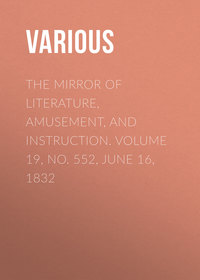Kitabı oku: «The Mirror of Literature, Amusement, and Instruction. Volume 19, No. 552, June 16, 1832», sayfa 4
Various
Bir şeyler ters gitti, lütfen daha sonra tekrar deneyin
Türler ve etiketler
Yaş sınırı:
12+Litres'teki yayın tarihi:
30 eylül 2018Hacim:
52 s. 4 illüstrasyonTelif hakkı:
Public Domain